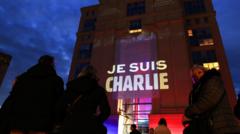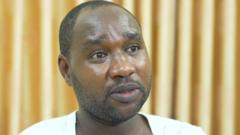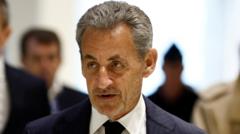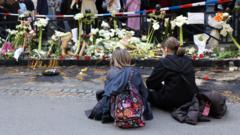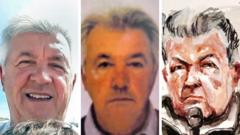Eight defendants linked to the 2020 murder of French educator Samuel Paty face judgment in a Paris court. The trial highlighted the consequences of online rhetoric and its impact on radicalization, raising vital questions about legal accountability in the context of hate-fueled violence.
Justice Looms as Defendants Await Verdict in Samuel Paty Murder Case
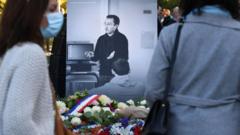
Justice Looms as Defendants Await Verdict in Samuel Paty Murder Case
The trial of eight individuals accused of aiding the murder of French teacher Samuel Paty concludes in Paris, with significant implications for free speech and radicalization.
Eight individuals implicated in the abetting of the murder of French teacher Samuel Paty are poised to hear their verdict after a six-week trial that unfolded in Paris. The accused include the father of a student whose false claims led to a cascade of events resulting in Paty's brutal beheading in October 2020.
Among those on trial is the father of a girl whose fabricated assertion about Paty's alleged preferential treatment against Muslims catalyzed the violent incident. The charges also encompass a Muslim activist who orchestrated an online campaign against Paty, two childhood associates of the Chechen-born murderer Abdoullakh Anzorov—who reportedly assisted in weapon acquisition—and four other radicalized individuals with whom Anzorov communicated via social media.
Anzorov, 18, was killed by police moments after he murdered the 47-year-old history-geography teacher outside his secondary school in Conflans-Saint-Honorine. Driven by misinformation circulating online, which falsely portrayed that Paty had ordered Muslim students to leave his class before displaying obscene images of the prophet Muhammad, Anzorov executed the attack. In actuality, Paty was teaching a lesson on freedom of speech and had cautioned students to avert their eyes if they might be offended.
The student, known as Z. Chnina, had not attended the class during the incident yet informed her father of the alleged discrimination, which ultimately instigated a hateful outcry against Paty. The trial's core debate revolves around whether individuals, unaware of the murder beforehand, can still be implicated for "terrorist association" due to their statements sparking violent outcomes.
This week, the prosecution concluded by seeking prison sentences ranging from 18 months to 16 years, asserting that the defendants' actions, though indirect, contributed to the atrocity. Paty's family expressed dissatisfaction with the prosecution's decision to seek reduced charges and avoid pursuing maximum sentences.
During the court proceedings, Z. Chnina, now 17, provided her testimony, tearfully apologizing for the role her lies played in leading to the tragedy. Her father, Brahim Chnina, mobilized an online campaign against Paty, recruiting activist Abdelhakim Sefrioui, pushing the anti-Paty narrative that spread across social media platforms.
Despite the prosecution's assertion that Chnina and Sefrioui knew their actions could incite violence, both claimed they had never called for Paty's harm. Nonetheless, they were charged based on the idea that their rhetoric could be linked to jihadist violence. As the trial nears its conclusion, long prison sentences have been sought for the two collaborators who assisted Anzorov in the days leading to the attack.
The court's ruling will serve as a precedent for evaluating the legal ramifications of statements made online and their potential influence on consequential acts of violence, highlighting the critical intersection of free speech, radicalization, and accountability in modern society.




